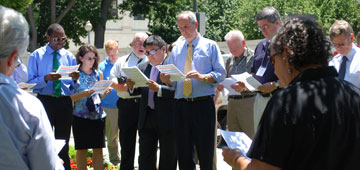Men and women dressed in corporate attire step outside of their air-conditioned offices into the mid-day, midsummer heat. Crisp, starched shirts and tailored suits quickly wilt while they join hands, bow their heads and pray.
Why? Because:
- Every 32 seconds a child is born into poverty in the United States
- 14.1 million unemployed are looking for work; 6.3 million of them have not worked for the past 27 weeks
- 40 million depend for their daily bread on programs that fight hunger
- 1.4 billion live in extreme poverty around the globe
- Millions are dying of HIV/AIDS, tuberculosis and malaria
- And, Congress is trying to balance a federal budget that could seriously impact the lives of those already on the edge.
The Washington Interreligious Staff Community, an informal network of faith-based workers who toil together on common issues of social justice, are joining together daily on the front lawn of The United Methodist Building on Capitol Hill to pray for a "faithful budget."
"The vigils taking place are an interreligious effort to raise the voice of people of faith on behalf of the poorest and most vulnerable among us," said Jim Winkler, top executive for The United Methodist Church's Board of Church and Society. "We are sending a visible signal to those in power that we do not believe the negotiations over the debt ceiling and budget can be resolved on the backs of poor people."
The prayer vigils began July 11 and will continue each weekday at 12:30 p.m. through July 22, when a White House-Congressional agreement on the budget and debt ceiling is expected.
The United Methodist Building faces the U.S. Capitol and is across the street from the Supreme Court. The building houses the Washington offices for the United Methodist Board of Church and Society, Commission on Religion and Race, Committee on Relief, Women's Division and Council of Bishops. It also houses the Washington-based offices of the National Council of Churches of Christ, Presbyterian Church (U.S.A.), Episcopal Church, United Church of Christ, Catholic Relief Services, Mennonite Central Committee, Church World Service, Muslim Public Affairs Council, Faith and Politics Institute, Interreligious Coalition on Smoking and Health, Churches for Middle East Peace and a number of other boards and agencies.
Those gathered for the daily vigils often walk the same halls and lobby in the same offices of Congress, advocating for many of the services threatened by budget cuts.
The July 14 prayer vigil organized and lead by the United Methodist social agency staff specifically lifted up the Supplemental Nutrition Assistance Program (SNAP) and other programs to fight hunger that help 40 million people in the United States.
"We pray that our elected leaders will have courage to protect critical health programs such as Medicaid from budget cuts and strengthen global efforts to eradicate pandemic diseases such as HIV/AIDS, tuberculosis and malaria," were the words of their prayer.
Religious leaders representing the Christian, Jewish and Muslim faiths talked about their concerns over the budget negotiations during a July 14 conference call.
The Rev. John McCullough, a United Methodist pastor and executive director of Church World Service, agreed that the current budget debate is "deeply disappointing and disturbing."
The faith leaders also sent letters to President Obama; Senate Majority Leader Harry Reid, D-Nev.; Speaker of the House John Boehner, R-Ohio; Senate Minority Leader Mitch McConnell, R-Ky.; and Minority Leader Nancy Pelosi, D-Calif. Bishop Larry M. Goodpaster, president of the United Methodist Council of Bishops, was among the signers.
The schedule for the remaining prayer vigils on the lawn of The United Methodist Building are:
July 19: Columban Center for Advocacy and Outreach
July 20: National Council of Churches
July 21: Evangelical Lutheran Church in America
July 22: United Church of Christ
Previous vigils were lead by the Leadership Conference of Religious Women, an association of leaders of Catholic sisters, and Maryknoll, a Catholic mission organization; the Islamic Society of North America; NETWORK, a Catholic social justice lobby; the United Methodist Board of Church and Society, the Presbyterian Church (USA) Office of Public Witness and Ecumenical Advocacy Days.
*Gilbert is a multimedia reporter for the young adult content team at United Methodist Communications, Nashville, Tenn.
News media contact: Kathy L. Gilbert, Nashville, Tenn., (615) 742-5470 or [email protected].
Related Video
Prayers for a Just and Compassionate Federal Budget
Related Articles
Budget battle: Don't forget the poor
Ex-gang of six members to unveil debt plan
Churches form 'circle of protection' around poor
Faith leaders look at budget's 'moral' impact
CWS warns of 2012 aid cut disaster
Resources
Like what you're reading? Support the ministry of UM News! Your support ensures the latest denominational news, dynamic stories and informative articles will continue to connect our global community. Make a tax-deductible donation at ResourceUMC.org/GiveUMCom.





